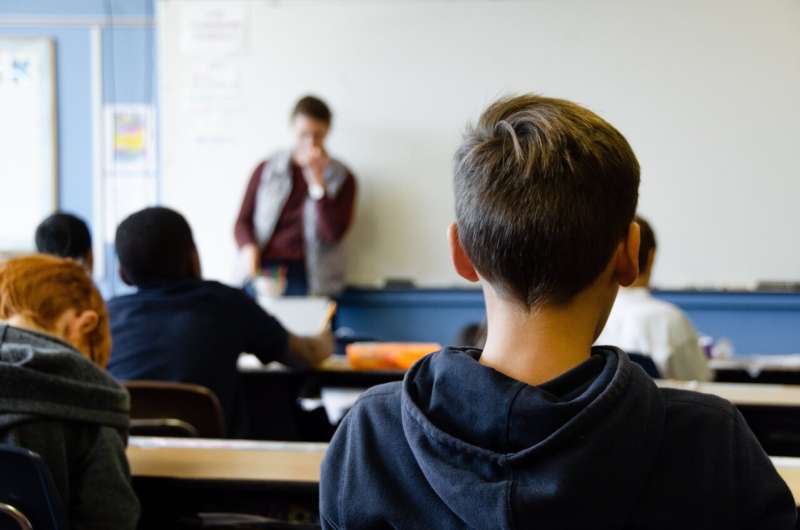This article has been reviewed according to Science X's editorial process and policies. Editors have highlighted the following attributes while ensuring the content's credibility:
fact-checked
trusted source
written by researcher(s)
proofread
'How long before climate change will destroy the Earth?': Research reveals what Australian kids want to know

Every day, more children discover they are living in a climate crisis. This makes many children feel sad, anxious, angry, powerless, confused and frightened about what the future holds.
The climate change burden facing young people is inherently unfair. But they have the potential to be the most powerful generation when it comes to creating change.
Research and public debate so far has largely failed to engage with the voices and opinions of children—instead, focusing on the views of adults. Our research set out to change this.
We asked 1,500 children to tell us what they wanted to know about climate change. The results show climate action, rather than the scientific cause of the problem, is their greatest concern. It suggests climate change education in schools must become more holistic and empowering, and children should be given more opportunities to shape the future they will inherit.
Questions of 'remarkable depth'
In Australia, research shows 43% of children aged 10 to 14 are worried about the future impact of climate change, and one in four believe the world will end before they grow up.
Children are often seen as passive, marginal actors in the climate crisis. Evidence of an intergenerational divide is also emerging. Young people report feeling unheard and betrayed by older generations when it comes to climate change.
Our study examined 464 questions about climate change submitted to the Curious Climate Schools program in Tasmania in 2021 and 2022. The questions were asked by primary and high school students aged 7 to 18.
The children's questions reveal a remarkable depth of consideration about climate change.
Kids are thinking globally
The impacts of climate change were discussed in 38% of questions. About 10% of questions asked about impacts on places, such as:
- "With the rate of climate change, what will the Earth be like when I'm an adult?"
- "What does the melting of glaciers in Antarctica mean for Tassie (Tasmania) and our climate?"
These questions demonstrate children's understanding of the global scale of the climate crisis and their concern about places close to home.
How climate change will affect humans accounted for 12% of questions. Impacts on animals and biodiversity were the subject of 9% of questions. Examples include:
"Will climate change make us live elsewhere, e.g., underwater or in space?"
"What species may become extinct due to climate change, which species could adapt to changing conditions and have we already seen this begin to happen?"
Approximately 7% of questions asked about ice melting and/or sea-level rise, while 3% asked about extreme weather or disasters.
'What can we do?'
Action on climate change was the most frequent theme, discussed in 40% of questions. Some questions involved the kinds of action needed and others focused on the challenges in taking action. They include:
"How would you make rapid climate improvements without sacrificing industry and finance?"
Around 16% of questions asked about, or implied, who was responsible for climate action. Governments and politicians were the largest group singled out. Other questions asked about the responsibilities of schools, communities, states, countries and individuals. Examples include:
- "What can I do as a 12-year-old to help the planet, and why will these actions help us?"
- "If the world knows about climate change, why has not much happened?"
Some 20% of questions suggested action by specific sectors of the economy. This included stopping using fossil fuels and moving to renewable energy or nuclear power. Some suggested action related to food, agriculture or fisheries.
Existential worries
In 27% of questions, students raised existential concerns about climate change. This reveals the urgency and frustration many children feel.
The largest group of these questions (15%) asked for predictions of future events. Some 5% of questions implied the planet, or humanity, was doomed. They included:
"Will all the reefs die?"
"How long before climate change will destroy the Earth?"
"How long will we be able to survive on our planet if we do nothing to try to slow down/reverse climate change?"
Why is Earth getting hot?
Scientific questions about climate change made up 25% of the total. The largest group related to the causes and physical processes, such as:
- "What causes the Earth to get hotter due to climate change?"
- "Would our world be the same now if the Industrial Revolution hadn't happened?"
- "How do they know the climate and percentage of gases, such as methane, in the 1800s?"
What all this means
Our analysis indicates children are very concerned about how climate change affects the things and places they care about. Children also want to know how to contribute to solutions—either through their own actions or influencing adults, industries and governments. Children asked fewer questions about the scientific evidence for climate change.
So what are the implications of this?
Research shows that where climate change is taught in schools, it is primarily represented as a scientific and environmental issue, without focus on the social and political causes and challenges.
While children need information about the science of global warming, our research suggests this is not enough. Climate change should be integrated into all subjects in the curriculum, from social studies to math to food.
Teachers should also be trained to understand climate challenges themselves, and to identify and support students suffering from climate distress.
And children must be given opportunities to get involved in shaping the future. Governments and industry should commit to listening to children's concerns about climate change, and acting on them.
Provided by The Conversation
This article is republished from The Conversation under a Creative Commons license. Read the original article.![]()





















